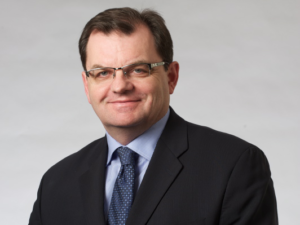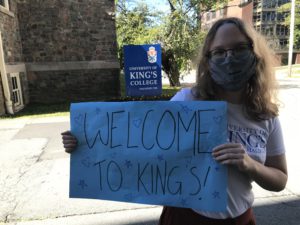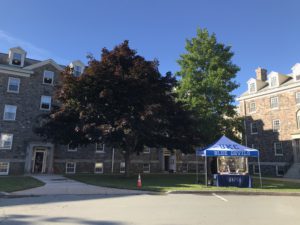
Dear King’s community,
I have not written to you since ending my weekly letters during the first months of the pandemic. Since then, we have each faced challenges, amplified by isolation. Nonetheless, despite COVID-19 and all its complications and uncertainties, I hope the warm balm of the summer months helped to buoy your hope and optimism as we adjusted to our shared new normal. In short, I hope you and yours are well as we collectively prepare to face the next wave in this ongoing pandemic.
Over the summer, the volume and pace of work by everyone at King’s was unprecedented. As a result, before giving you a series of updates, I acknowledge with gratitude and thanks all that our faculty, staff and students have done to make possible the term now underway for – astonishingly – a slightly larger student community than we had in 2019-2020. Minimally, this is the core message I want to share with you as we reach the end of September – we have held our own. But I hope to convince you we have done more than that. And I want you to know we could not have done it without your support, which has come to us in all kinds of manifestations, most importantly, from the knowledge that you have been thinking of us and rooting for us. Thank you.
Safety First
Of the many updates to share, I start with the most important: the safety of our students, faculty, staff, and our Halifax neighbours. In a meeting with all university presidents, Nova Scotia’s Chief Medical Officer of Health, Dr. Robert Strang, commented (to wide amusement) that one of the smallest universities (King’s) had one of the longest safety plans. I, of course, was not surprised, since we developed our plan from the ground up. The university’s plan is the combination of the plans of each program, department, and facility. Their careful preparation ensures our plan is more than just a document. It is the mutual commitment we have made to each other.
We live in one of the safest jurisdictions on the continent in which to start our academic year and that is a huge advantage to us. King’s and other Nova Scotia universities have been well served by our government and public health leaders, all of whom have consistently given priority to enabling our universities to pursue their missions in these challenging times. I could give many examples, including the extraordinary testing program the province created to ensure the arrival of thousands of students from beyond the Atlantic provinces did not introduce the virus into university communities and Nova Scotia. But the better example is the call Premier McNeil had with all presidents, just as this program was being launched, to urge us to be as concerned for the mental health and holistic well-being of self-isolating students as we were with their compliance with public health rules.

We owe admiration and thanks to our residence- and day-students who returned to Halifax and were required to be tested three times over 14 days of self-isolation. They behaved exactly as we knew they would – as responsible members of the King’s and Halifax communities. I am sure the same is true of how all our students, whether in residence or out, in Halifax or beyond, are now finding ways to combine adherence to safety protocols with their deep desire for togetherness. A word of appreciation is also in order for student leaders in the KSU and students who worked in various jobs to support planning for online learning. Our efforts have been successful in no small measure because they are informed by essential student contributions.
In these uncharted waters, we proceed expecting to make mistakes and to learn about gaps and oversights in our exhaustive planning. Yet I am confident in how the year and the year after this one will unfold. The bedrock of this confidence is how our community has made the cliché of “We are in this together” into lived reality. The strength of our community – of our care and concern for each other – has come to the fore. The pandemic has made our community stronger.
Academic Programs
When we announced that we, like Dalhousie and most Canadian universities, would, be teaching online, there was understandable concern that our students would be missing out on the holistic King’s experience that defines a King’s education. I carry those concerns with me every minute of every day. I cannot describe how much I miss seeing and saying hello to our returning students and how much Kathryn and I miss the month of gatherings in the Lodge we would by now have hosted. But equally, I have always been confident that our online teaching and learning would not be like that offered elsewhere, just as our in-person teaching and learning has been distinctive for decades. I knew our faculty and students, with the support of our staff, would find a way to do what they always do – make each class a community of mutual learning based on care and concern for each other and a shared fascination with the questions each and every answer poses.
I am immensely proud of the adaptability and creativity with which our faculty have reimagined King’s as an online university. In the Foundation Year, students are enjoying high-quality recorded lectures and “live” daily tutorials. Thanks to our gifted J-School videographers, Mark Pineo and Paul Robinson, as well, of course, to our gifted instructors, we were recently gratified when one student reported enjoying the “PBS quality” of our online lectures. FYP tutorials, which have been reduced in size from roughly 15 to 10, are reportedly “invigorating” for our tutors and students alike. The program has initiated “Read Now”, which gathers students for an hour of real-time reading the night before every FYP lecture, lead by a faculty member or a friend of FYP, such as dons, the Chaplain, and maybe even the President! “FYP Nights”, a series of evening lectures and performances that have amplified and diversified the perspectives brought to the FYP curriculum, have continued this year as virtual events.
Equally, courses in our honours programs and in journalism (undergraduate and postgraduate) have emphasised a high degree of student engagement in their course planning. Few courses are wholly asynchronous or synchronous, but are instead a combination of both with emphasis on study teams and other methods that promote student interaction. In adapting the advice we have received from online learning mentors, we have looked to blend asynchronous and synchronous moments for a characteristic King’s experience. Starting with the summer residency of our MFA and with the MJ that started in the summer, synchronous learning that brings students and faculty together in real time is a core part of the King’s approach to online learning.
However, there is much more to be done. We are very aware that online learning does not give our students all we would like them to have. It is why each of our academic programs continues to think of our online instruction as a work in progress, constantly adapting to what we learn from experience in making it better. It is why we are adjusting our safety plans to create greater latitude for outdoor events and activities for larger groups of students. Meanwhile, among other things, first-year students have been matched with upper year mentors; varsity athletes are building community as they prepare under COVID-19 protocols for their eventual return to competition, and the choir will soon be singing Evensong online.
All we do continues to be an inspiring collective effort. Last Thursday, the Board of Governors met and received a note from Dr. Neil Robertson, FYP’s Director, emphasising the point. It communicated “the deep appreciation of the Foundation Year Program for the many ways in which we have been supported by the College in launching FYP online this year.” The note – which I attach in its entirety – concludes, “I have heard from our students real appreciation not only for what we are doing, but how we are doing it.” Faculty members of the Board assured that body that Neil expressed a sentiment shared across our academic programs.
From my perspective, there are few things more gratifying than the whole community rallying to support our students, especially when they are in such extraordinary need of support.
Except one: if the ‘whole community’ and ‘the student experience’ were as diverse, equitable, and inclusive as we can possibly make it.
Equity, Diversity and Inclusion
Since May, we have, like all institutions in our society, faced calls to confront and address anti-Black racism at King’s and in our community. And like every university, we are being reminded by the impending fifth anniversary of the Truth and Reconciliation Commission that we need more action and fewer words on making reconciliation reality – something that is vividly illustrated by the actions Mi’kmaw fishers are now taking to implement their right to earn a moderate livelihood from fishing.
At Thursday’s Board meeting, I delivered the report on Equity, Diversity and Inclusion at King’s that the Board had in 2019 mandated me to write. The full report will be posted to our website with the hope it will be read here at King’s and in our wider community. It is a lengthy document that aspires to be comprehensive and frank in assessing both the challenges and opportunities we face to become a community defined by its diversity. It calls for an action plan to strengthen, reinforce and give direction to the many good things already happening, and much else of a programmatic nature. More fundamentally, it calls on King’s to “think less of diversity and inclusion as areas for improvement as it continues to pursue its academic missions, and to instead think of diversity and inclusion as essential dimensions of its educational mission”. It gives particular attention to our obligations to students from the African Nova Scotian and the Mi’kmaw communities, and to the opportunities we have to grow and learn from their greater participation in the life of King’s.
I look forward to the discussions and action that I am hopeful the report will prompt.
Campus Restoration
In March, King’s made the bold decision to go ahead with the restoration of Chapel, Middle and Radical Bay, in the midst of a lockdown. Three weeks ago, students finishing their self-isolation in Alex Hall crossed the Quad to join students arriving from within the Atlantic Bubble to be the first of a new century of students to call these buildings home.
 The restoration of three of our beautiful bays in the pandemic is symbolic of all we have accomplished in the last six months and of our confidence in our future, in and beyond the pandemic. I thank Dean Katie Merwin for elevating the project from the realm of construction to that of poetry by linking it to the vision of Rev. Dr. Robert Crouse, that we are a community of hope and memory. Each of these bays are now “modern”, with a spiffy shared common room and new furniture and twenty-first century bathrooms, plumbing and heating. The artistry and attention to detail is exemplified in baseboards that have been cut to align with the sloping the floors developed over the past 90 years, and as you run your hand over the now pristine walls, you can feel the sways of the 1920’s plaster. The century of living and learning in community that has happened in these bays is still embodied in them.
The restoration of three of our beautiful bays in the pandemic is symbolic of all we have accomplished in the last six months and of our confidence in our future, in and beyond the pandemic. I thank Dean Katie Merwin for elevating the project from the realm of construction to that of poetry by linking it to the vision of Rev. Dr. Robert Crouse, that we are a community of hope and memory. Each of these bays are now “modern”, with a spiffy shared common room and new furniture and twenty-first century bathrooms, plumbing and heating. The artistry and attention to detail is exemplified in baseboards that have been cut to align with the sloping the floors developed over the past 90 years, and as you run your hand over the now pristine walls, you can feel the sways of the 1920’s plaster. The century of living and learning in community that has happened in these bays is still embodied in them.
This restoration project is so significant – magnificent even – that it deserves its own communication, which it shall receive very soon. Consider this the teaser. Soon, I will be making an announcement that will explain how we were able to accomplish this and what gave us the courage to move ahead. In the next few days, I will speak with you again, to share news of this project more fully, to talk further about this project, to explain how it reflects our outlook for the future and to ask for your assistance as we build upon it.
You will hear from me again soon.
Bill

